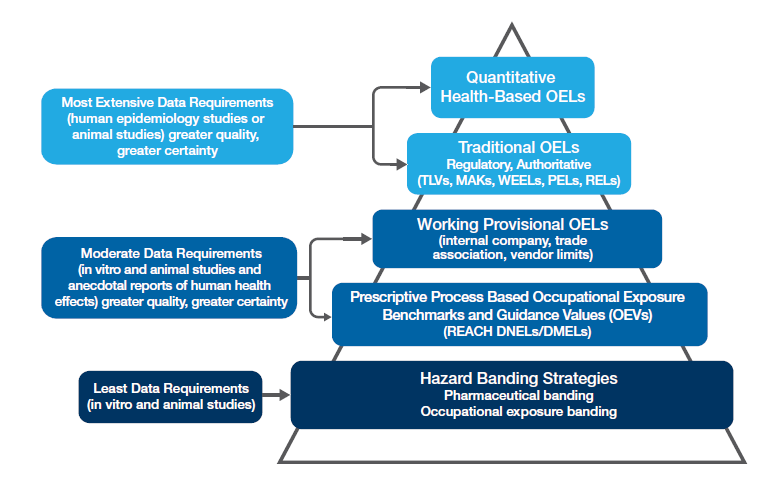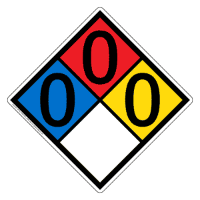|
Occupational Exposure Banding
Occupational exposure banding, also known as hazard banding, is a process intended to quickly and accurately assign chemicals into specific categories (bands), each corresponding to a range of exposure concentrations designed to protect worker health. These bands are assigned based on a chemical’s toxicological potency and the adverse health effects associated with exposure to the chemical. The output of this process is an occupational exposure band (OEB). Occupational exposure banding has been used by the pharmaceutical sector and by some major chemical companies over the past several decades to establish exposure control limits or ranges for new or existing chemicals that do not have formal OELs. Furthermore, occupational exposure banding has become an important component of the Hierarchy of Occupational Exposure Limits (OELs). The U.S. National Institute for Occupational Safety and Health (NIOSH) has developed a process that could be used to apply occupational exposure banding ... [...More Info...] [...Related Items...] OR: [Wikipedia] [Google] [Baidu] |
European Chemicals Agency
The European Chemicals Agency (ECHA; ) is an agency of the European Union which manages the technical and administrative aspects of the implementation of the European Union regulation called Registration, Evaluation, Authorisation and Restriction of Chemicals (REACH). ECHA is the driving force among regulatory authorities in implementing the EU's chemicals legislation. ECHA has to ascertain that companies comply with the legislation, advances the safe use of chemicals, provides information on chemicals and addresses chemicals of concern. It is located in Helsinki, Finland. ECHA is an independent and mature regulatory agency established by REACH. It is not a subsidiary entity of the European Commission. The agency, currently headed by Acting Executive Director Shay O’Malley, started working on 1 June 2007. Establishment The ECHA was created by European Union regulation dating from 18 December 2006 to manage the then-new legislation to regulate the manufacture and use of che ... [...More Info...] [...Related Items...] OR: [Wikipedia] [Google] [Baidu] |
Industrial Hygiene
Occupational hygiene (United States: industrial hygiene (IH)) is the anticipation, recognition, evaluation, control, and confirmation (ARECC) of protection from hazards at work that may result in injury, illness, or affect the well being of workers. These hazards or stressors are typically divided into the categories biological, chemical, physical, ergonomic and psychosocial. The risk of a health effect from a given stressor is a function of the hazard multiplied by the exposure to the individual or group. For chemicals, the hazard can be understood by the dose response profile most often based on toxicological studies or models. Occupational hygienists work closely with toxicologists (see Toxicology) for understanding chemical hazards, physicists (see Physics) for physical hazards, and physicians and microbiologists for biological hazards (see Microbiology Tropical medicine Infection). Environmental and occupational hygienists are considered experts in exposure science and ex ... [...More Info...] [...Related Items...] OR: [Wikipedia] [Google] [Baidu] |
Chemical Safety
Chemicals as elements, compounds, mixtures, solutions and emulsions are very widely used and transported in the modern industrial society. Of necessity, they are also used in schools, universities and other training facilities to educate pupils in their safe use and handling and also are commonly used in domestic situations for cleaning, gardening and DIY. However, there are chemicals that should not mix or get in contact with others, as they can produce byproducts that may be toxic, carcinogenic, explosive etc, or can be dangerous themselves. To avoid disasters and mishaps, maintaining safety is considered paramount, especially by chemists. Chemical safety includes all those policies, procedures and practices designed to minimise the risk of exposure to potentially hazardous chemicals. This includes the risks of exposure to persons handling the chemicals, to the surrounding environment, and to the communities and ecosystems within that environment. The hazardous nature of many ... [...More Info...] [...Related Items...] OR: [Wikipedia] [Google] [Baidu] |
Occupational Safety And Health
Occupational safety and health (OSH), also commonly referred to as occupational health and safety (OHS), occupational health, or occupational safety, is a multidisciplinary field concerned with the safety, health, and welfare of people at work (i.e. in an occupation). These terms also refer to the goals of this field, so their use in the sense of this article was originally an abbreviation of ''occupational safety and health program/department'' etc. The goal of an occupational safety and health program is to foster a safe and healthy occupational environment. OSH also protects all the general public who may be affected by the occupational environment.Fanning, Fred E. (2003). Basic Safety Administration: A Handbook for the New Safety Specialist, Chicago: American Society of Safety Engineers Globally, more than 2.78 million people die annually as a result of workplace-related accidents or diseases, corresponding to one death every fifteen seconds. There are an additional 3 ... [...More Info...] [...Related Items...] OR: [Wikipedia] [Google] [Baidu] |
Health And Safety Executive
The Health and Safety Executive (HSE) is a UK government agency responsible for the encouragement, regulation and enforcement of workplace health, safety and welfare, and for research into occupational risks in Great Britain. It is a non-departmental public body of the United Kingdom with its headquarters in Bootle, England. In Northern Ireland, these duties lie with the Health and Safety Executive for Northern Ireland. The HSE was created by the Health and Safety at Work etc. Act 1974, and has since absorbed earlier regulatory bodies such as the Factory Inspectorate and the Railway Inspectorate though the Railway Inspectorate was transferred to the Office of Rail and Road in April 2006. The HSE is sponsored by the Department for Work and Pensions. As part of its work, HSE investigates industrial accidents, small and large, including major incidents such as the explosion and fire at Buncefield in 2005. Though it formerly reported to the Health and Safety Commission, on 1 A ... [...More Info...] [...Related Items...] OR: [Wikipedia] [Google] [Baidu] |
Control Banding
Control banding is a qualitative or semi-quantitative risk assessment and management approach to promoting occupational health and safety. It is intended to minimize worker exposures to hazardous chemicals and other risk factors in the workplace and to help small businesses by providing an easy-to-understand, practical approach to controlling hazardous exposures at work. The principle of control banding was first applied to dangerous chemicals, chemical mixtures, and fumes. The control banding process emphasizes the controls needed to prevent hazardous substances from causing harm to people at work. The greater the potential for harm, the greater the degree of control needed to manage the situation and make the risk “acceptable.” A single ''control'' technology or strategy is matched with a single ''band'', or range of exposures (e.g. 1-10 milligrams per cubic meter) for a particular class of chemicals (e.g. skin irritants, reproductive hazards). Here is an example of four ... [...More Info...] [...Related Items...] OR: [Wikipedia] [Google] [Baidu] |
Occupational Hygienist
Occupational hygiene (United States: industrial hygiene (IH)) is the anticipation, recognition, evaluation, control, and confirmation (ARECC) of protection from hazards at work that may result in injury, illness, or affect the well being of workers. These hazards or stressors are typically divided into the categories biological, chemical, physical, ergonomic and psychosocial. The risk of a health effect from a given stressor is a function of the hazard multiplied by the exposure to the individual or group. For chemicals, the hazard can be understood by the dose response profile most often based on toxicological studies or models. Occupational hygienists work closely with toxicologists (see Toxicology) for understanding chemical hazards, physicists (see Physics) for physical hazards, and physicians and microbiologists for biological hazards (see Microbiology Tropical medicine Infection). Environmental and occupational hygienists are considered experts in exposure science and e ... [...More Info...] [...Related Items...] OR: [Wikipedia] [Google] [Baidu] |
Safety Data Sheet
A safety data sheet (SDS), material safety data sheet (MSDS), or product safety data sheet (PSDS) is a document that lists information relating to occupational safety and health for the use of various substances and products. SDSs are a widely used system for cataloguing information on chemicals, chemical compounds, and chemical mixtures. SDS information may include instructions for the safe use and potential hazards associated with a particular material or product, along with spill-handling procedures. The older MSDS formats could vary from source to source within a country depending on national requirements; however, the newer SDS format is internationally standardized. An SDS for a substance is not primarily intended for use by the general consumer, focusing instead on the hazards of working with the material in an occupational setting. There is also a duty to properly label substances on the basis of physico-chemical, health, or environmental risk. Labels can include ha ... [...More Info...] [...Related Items...] OR: [Wikipedia] [Google] [Baidu] |
GESTIS Substance Database
GESTIS Substance Database is a freely accessible online information system on chemical compounds. It is maintained by the Institut für Arbeitsschutz der Deutschen Gesetzlichen Unfallversicherung (IFA, Institute for Occupational Safety and Health of the German Social Accident Insurance). Information on occupational medicine and first aid is compiled by Henning Heberer and his team (TOXICHEM, Leuna). The database contains information for the safe handling of hazardous substances and other chemical substances at work: * toxicology/ecotoxicology * important physical and chemical properties * application and handling * health effects * protective measures and such in case of danger (incl. first aid) * special regulations e.g. GHS classification and labelling according to CLP Regulation (pictograms, H phrases, P phrases). The available information relates to about 9,400 substances. Data are updated immediately after publication of new official regulations or after the issue of new sci ... [...More Info...] [...Related Items...] OR: [Wikipedia] [Google] [Baidu] |
American Industrial Hygiene Association
The American Industrial Hygiene Association (AIHA) is a 501(c)6 non-profit organization, whose mission is "Creating knowledge to protect worker health." The American Industrial Hygiene Association works to provide information and resources to Industrial Hygienists and Occupational Health professionals. About The American Industrial Hygiene Association (AIHA) is an official participant of the OSHA Alliance Program. Through the AIHA-OSHA Alliance, AIHA helps OSHA provide AIHA members and the general public information on OSHA's rule making and employer compliance laws, in order to fulfill the mutual mission of ensuring safe and healthy conditions for workers. The actionable plan is twofold: 1). raise awareness, and 2). be a source of outreach and communication. AIHA worked with OSHA to provide resources available to employers and employees regarding specific hazards pertaining to relevant industries, in order to create awareness with workers and employers. AIHA has provided several ... [...More Info...] [...Related Items...] OR: [Wikipedia] [Google] [Baidu] |


